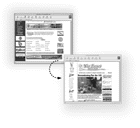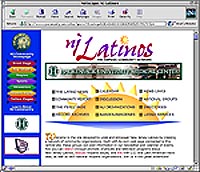By Pat Ford
Pew Center for Civic Journalism
Peaks Island, in the Casco Bay off Portland, Maine, is accessible only by ferry. It’s a lovely community of about 1,000 year-round residents but you wouldn’t read a lot about it in the local paper, the Portland Press Herald. There’s just not a whole lot of news out there that would get a city desk reporter on a boat to cover it. The islanders, themselves, have always kept on top of local goings-on through a newsletter, cut and pasted and copied and given out at the library and supermarket.
But a few months ago, the Press Herald helped Peaks Island build a virtual bridge with the rest of the world: It gave a local school teacher the tools to launch the Peaks Island web site. Suddenly, all the Peaks Island news – the club outings and essay contest awards, the tides and weather and ferry schedules – is available anywhere in the world.
The key to this new accessibility is the “Community Publishing System,” software that allows community groups to publish on-line with little expertise. The Press Herald is one of a handful of newspapers giving the software to local civic groups, non-profit organizations or advertisers.
 |
| North Jersey community groups are tied together at www.njcommunity.com (above left) and linked to The Record’s web site (above right). |
Using the Community Publishing System is not much more complicated than filling out a form. The groups put information about themselves in the designated boxes, click on “submit” and, presto, they have a web site and are part of a network tied to their local paper, easily searchable and connected to other groups with similar concerns and agendas.
It is basic civic journalism – empowering citizens by giving them a voice. The Community Publishing System may become a powerful new reporting tool. Indeed, some users believe it may revolutionize the way journalists do their job – allowing them a new level of access to the groups they cover.
Glenn Ritt, vice president of news and information at the Bergen Record, has spent most of the last year building what is easily the most ambitious project using the Community Publishing System: A network of nearly 500 governmental and community groups, organized into 18 channels – from health to education, from religion to family – are all tied together at www.njcommunity.com and linked to the Record’s web site, www.bergen.com. Ritt sees this network as the ultimate “third place,” where reporters could go to take the pulse of the community they serve.
“It is a window to the world,” says Ritt. “I don’t have the time and can’t physically get everywhere so I don’t know what’s happening. But now, I can look at a universal calendar that shows what every group in North Jersey is doing today. I can use a search agent that will find any web site being used for the topic I’m researching. I can bore, literally, into the church basement and see how groups affiliate with one another. I can go to a department of government and find people delegating to other departments and I discover a part of government that I never knew existed.”
Reporters can also initiate and track conversations with local groups. An education reporter, for example, could put out a query that would go to every school administrator in the Bergen region.A reporter could monitor conversations administrators are having with each other and find out what the issues are in the school system and what administrators think of those issues.
“It’s better than phoning,” says Ritt. “This is a more powerful process. They can get answers in a matter of hours.”
Or, he adds, a reporter can have his or her own site and invite sources in, as a way of gathering information.
So far, all of these are potential uses. Ritt is spending his time building the cyber infrastructure and hasn’t chosen to “introduce it formally into the newsroom.” So no reporters are actually using it, yet, to cover stories. But Record staff members are becoming aware of its potential value.
 Latino affairs columnist Miguel Perez is working with Ritt on a site called “NJLatinos,” which, so far, links 65 Latino organizations in Northern New Jersey that are creating their own web pages using the Community Publishing System. Perez sees the site, primarily, as a way to empower these organizations by giving them a chance to publicize themselves and their events and communicate with each other about issues of common concern. But he also foresees having the ability to conduct surveys through the site and enhance his reporting in other ways.
Latino affairs columnist Miguel Perez is working with Ritt on a site called “NJLatinos,” which, so far, links 65 Latino organizations in Northern New Jersey that are creating their own web pages using the Community Publishing System. Perez sees the site, primarily, as a way to empower these organizations by giving them a chance to publicize themselves and their events and communicate with each other about issues of common concern. But he also foresees having the ability to conduct surveys through the site and enhance his reporting in other ways.
“NJLatinos will have a list of all of New Jersey’s elected officials,” says Perez. “So I can send them an e-mail and ask them all to respond. We’ll have a directory of consuls for all Hispanic countries. We may want to survey all of them on an issue that affects U.S.-Latin American relations. So this will not only empower the community but it will also be available for reporters to use.”
As with other civic journalism tools, reporters are approaching this new one with caution. Record immigration reporter Elizabeth Llorente says she’s asked for training in how to use the system. She’s interested in having a site where she could quickly get an array of public opinions on the issues she covers to include in her stories. But she says she has some concerns.
“I wouldn’t want people to feel some kind of proprietary connection with me because I have a web site, any more than I’d want sources in my living room every week to chat,” says Llorente. “And it should always be supplemental to the best kind of reporting, and the ideal kind, which is going out into the real world and making a connection; finding people who don’t have that easy and frequent contact with the newspaper. That’s who journalists, at their best, find.”
The Community Publishing System is the brainchild of KOZ Inc., an Internet software company founded by Frank Daniels 3rd. This melding of journalism and high technology is natural for Daniels, scion of the Raleigh newspaper family that, until 1996, owned the News & Observer, which had the first Internet newspaper site.
KOZ CEO Mike Moran says the company could work directly with non-profit community groups without going through newspapers, but the papers already have ties to the community and relationships with advertisers. “It would take tens of millions of dollars to replicate what they’ve already got,” says Moran.
Other papers using the system include The Orlando Sentinel, The Columbian in Vancouver, WA., the CNC newspaper group outside of Boston, Lancaster Newspapers in Pennsylvania and the Denver Post, which uses it primarily to gather high school sports scores without having to staff games.
The newspapers sell advertising on the community sites and share the revenue with KOZ. But this is not yet a money-maker for the papers. The ads – though they are expensive in Portland and Bergen – barely cover the newspapers’ costs.
Executives at the papers say they believe they’re getting a different kind of benefit from the system. As the Internet becomes a more important source of information, the papers preserve their franchise bybuilding their brand name into more internet sites. In Bergen, for example, each of the nearly 500 sites created with the software the Record is providing prominently feature direct links back to the newspaper. Chances are, many of these groups would eventually create their own sites, anyway, and would be able to bypass the paper in providing information to their members and others.
The Record, by taking thelead, Ritt says, has made itself a permanent part of those sites – and built a role for itself as the hub of its community’s cyber-world.
“The newspaper is found in every community group,” he says. “We bring our product into the church basement.”
Kate Howell, marketing coordinator at The Orlando Sentinel, says community publishing is becoming a leading growth area on the Internet. “We want to make sure we build the communities,” she said.
In Portland, the Press Herald found that even some groups that already had their own web sites were happy to become part of the network the Press Herald is creating so that they are now linked to other community groups. . . and to the newspaper. The paper’s community coordinator, Jessica Tomlinson, sees this as good business.
“We want always to be the place to come to get that information,” she says. “Always, whether in print or on-line.”
